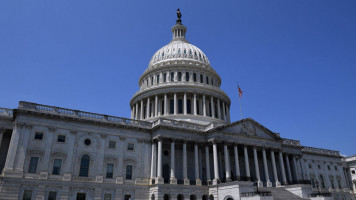Israel approves new settler homes in occupied West Bank
Israel has given the green light to 153 new settler homes to be built in the occupied West Bank, according to Israeli settlements watchdog Peace Now.
Hagit Ofran, spokesperson for the group, said the plans for the new homes were agreed last week, and will be built in sensitive areas of the occupied territories including the Ariel Carmel and Gush Etzion settlements.
This marks an end to an informal construction freeze in the Palestinian territory that lasted 18 months.
It follows an earlier report from the group that Israel was working to revive and extend plans for new Jewish settler homes in the contentious area of the occupied West Bank known as E1.
Israel's housing ministry is looking to build 55,548 units in the West Bank, more than 8,300 homes would be in E1.
E1 and the adjacent Maaleh Adumim settlement form an Israeli buffer east of Jerusalem that the Palestinians say would divide the West Bank and badly hurt the possibility of a contiguous Palestinian state.
"The area of Maale Adumim and E1 is one of the most sensitive areas in terms of the chances for two state solution," Peace Now wrote.
"For these reasons, whenever an Israeli leader tries to promote the plans in E1, the international community strongly condemns them."
The United States, the United Nations and the European Union oppose all Israeli settlement building but have voiced particular concern about plans for E1.
In 2013, faced with international pressure, Israeli Prime Minister Binyamin Netanyahu vetoed construction of some 1,200 homes there but Peace Now said the housing ministry had hired architects to prepare fresh blueprints.
"This planning, which contradicts any possible commitment to a two-state solution, continues," said last month's Peace Now report, although it also added that the plans could be years from fruition.
"They must be approved by the minister of defence and then go through the approval process of the planning authority," the English-language report said.
US-backed peace talks between the Palestinians and Israel collapsed in April 2014 amid bitter mutual recriminations.
A chief grievance of the Palestinians was settlement building on land they claim for a future state.

![Palestinians mourned the victims of an Israeli strike on Deir al-Balah [Getty]](/sites/default/files/styles/image_684x385/public/2024-11/GettyImages-2182362043.jpg?h=199d8c1f&itok=xSHZFbmc)


![The law could be enforced against teachers without prior notice [Getty]](/sites/default/files/styles/image_684x385/public/2178740715.jpeg?h=a5f2f23a&itok=hnqrCS4x)
 Follow the Middle East's top stories in English at The New Arab on Google News
Follow the Middle East's top stories in English at The New Arab on Google News


